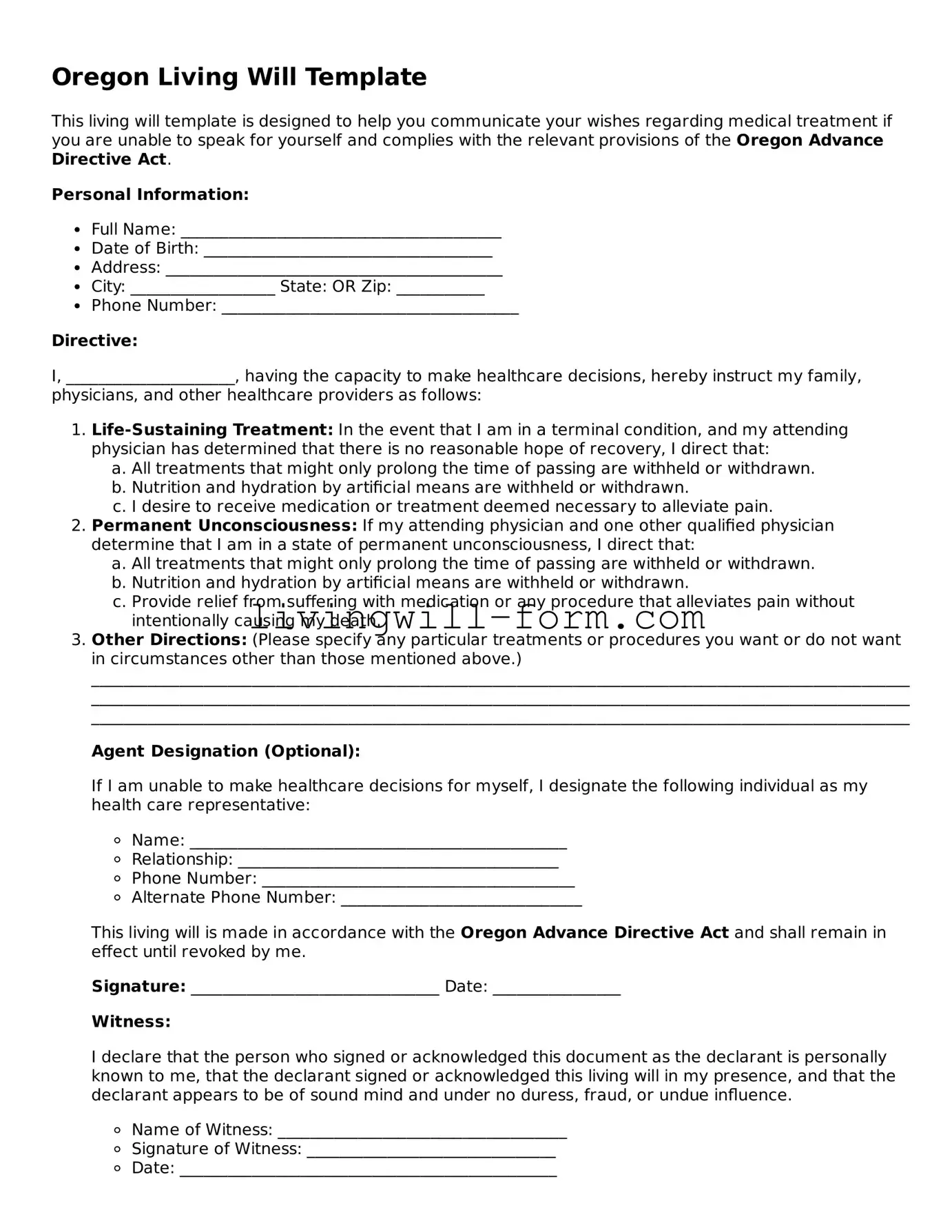The Health Care Power of Attorney (HCPOA) shares similarities with the Oregon Living Will form, primarily in its purpose to guide healthcare decisions when an individual is incapacitated. Both documents allow a person to delineate their healthcare preferences ahead of time, but the HCPOA goes further by appointing a specific agent to make decisions on behalf of the individual, ensuring choices align closely with the person’s values and desires.
The Durable Power of Attorney (DPOA) for finances is another document with parallel functions to the Oregon Living Will, albeit in a different domain. While the Living Will focuses on healthcare decisions, the DPOA allows an individual to designate an agent to manage their financial affairs if they become unable to do so themselves. Both documents are proactive measures to ensure an individual's matters are handled according to their wishes should they become incapacitated.
The Do Not Resuscitate (DNR) order is closely aligned with the principles of the Oregon Living Will in that it communicates a specific medical treatment preference. A DNR specifically instructs healthcare providers not to perform CPR if a patient’s breathing stops or if the heart stops beating. Like a Living Will, it is a directive used to uphold the patient’s autonomy over their medical care at the end of life.
A Medical Power of Attorney (MPOA) document is akin to the Oregon Living Will, as it also deals with healthcare decisions. The critical difference is that the MPOA appoints a healthcare proxy to make decisions on behalf of the patient, focusing on a broader range of health care decisions than a Living Will, which is usually more focused on end-of-life care.
An Advance Health Care Directive serves a similar purpose to the Oregon Living Will by allowing individuals to specify their healthcare wishes in advance. This document combines elements of both the Living Will and a Health Care Power of Attorney, enabling individuals to detail their healthcare preferences and appoint a decision-maker, ensuring a comprehensive approach to future healthcare planning.
The Five Wishes document is an extensive form of Living Will that goes beyond the traditional scope by addressing personal, emotional, and spiritual needs alongside the medical and legal aspects. It encourages individuals to consider their comfort, how they want to be treated, and what they want their loved ones to know, offering a holistic approach to end-of-life planning similar to the intent behind the Oregon Living Will.
A Physicians Orders for Life-Sustaining Treatment (POLST) form complements the Oregon Living Will by providing detailed instructions for healthcare providers about life-sustaining treatments. While the Living Will typically outlines a person’s general desires regarding end-of-life care, the POLST form translates these desires into medical orders based on the individual’s current health status, ensuring that the care provided aligns with the patient's wishes.
The Appointment of Healthcare Representative is a document that, like the Oregon Living Will, deals with decisions related to healthcare. It specifically allows individuals to name a representative to make healthcare decisions on their behalf if they cannot do so, ensuring that someone familiar with the patient's wishes can guide their care.
A Living Trust is a document focused on managing an individual's assets, but it shares the anticipatory nature of the Oregon Living Will. Both documents allow individuals to arrange their affairs—whether personal health care or asset management—in advance to ensure their wishes are followed and to ease the burden on family members during challenging times.
Last Will and Testament, while primarily concerned with the distribution of assets posthumously, is similar in spirit to the Oregon Living Will by enabling individuals to express their wishes for their estate and, in certain aspects, their healthcare. Both documents are vital components of a comprehensive estate plan, ensuring individuals' preferences are honored in life and death.

